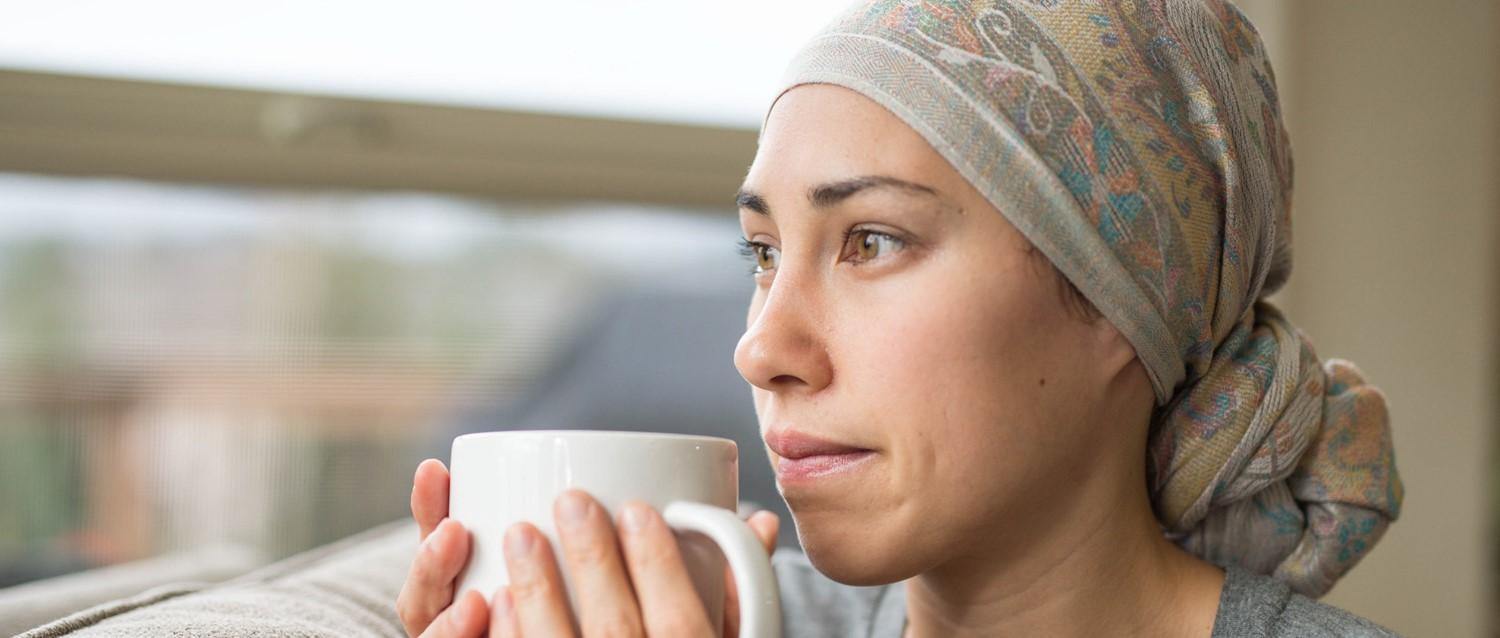
How to cope with anxiety after cancer
Peer reviewed by Dr Sarah Jarvis MBE, FRCGPAuthored by Gillian HarveyOriginally published 2 Oct 2019
- TéléchargerTélécharger
- Partager
With intensive and often lengthy treatment, it's hardly surprising that many of those diagnosed with cancer find the illness can dominate their lives. However, as going through cancer can be both life-changing and traumatic, many patients find that rather than the relief they expected to feel post-treatment, they are left feeling anxious.
Dans cet article :
Claire, 45, from Grimsby was diagnosed with throat cancer in 2016. After six weeks of intensive radiotherapy and chemotherapy, although she felt relieved, she also found the absence of the daily routine that her treatment had brought made her feel anxious.
"I felt as though I had lost the support network of doctors and nurses I had become accustomed to on a daily basis," she says. "I felt anxious about everything - guilt, a fear of germs, social anxiety and I even suffered from panic attacks."
Poursuivre la lecture ci-dessous
A natural response
However, although anxiety comes with a wealth of uncomfortable symptoms, it's important to remember it's an understandable response to the trauma we've been through.
"Having cancer is likely to cause all kinds of worries and fears, for ourselves and those we love. We are forced to face the idea of our own mortality, endure tricky, unpleasant treatments as well as finding ourselves not in full control of our own care and destiny. You may also have experienced pain that was debilitating. Quite understandably, this combination can trigger our anxiety response, which is a primitive survival response and in this state for a long time, it can literally reprogramme the brain to maintain this state post recovery," explains Dr Sharie Coombes, Psychologist of Foundations Therapy.
Sélection de patients pour Informations sur le cancer

Le cancer
Comment le cancer peut-il affecter votre santé mentale ?
Le diagnostic d'un cancer change la vie et peut avoir un impact significatif sur le bien-être émotionnel d'une personne, ainsi que sur son entourage. Grâce aux progrès de la médecine, nous améliorons constamment notre capacité à diagnostiquer et à traiter rapidement les différents cancers, ce qui a considérablement augmenté les chances de rémission ou de vivre plus longtemps avec la maladie. Mais ce qui est souvent considéré comme secondaire par rapport à l'impact physique du cancer, c'est son effet sur le bien-être mental d'une personne. La peur, l'anxiété, la tristesse et la colère sont des réactions courantes à un diagnostic, et il est essentiel de gérer correctement ces émotions pour améliorer la qualité de vie.
par Lydia Smith

Le cancer
Causes of cancer
Certain risk factors are known to increase the chance that one or more of your cells will become abnormal and lead to cancer.
par le Dr Colin Tidy, MRCGP
Symptômes d'anxiété
Anxiety may present in many different ways, including accelerated heart rate, trembling, nausea, muscle tension, inability to relax and insomnia.
However, the good news is that with the right support it can be managed and overcome.
"Cancer damages your mind as well as your body and it takes time and sometimes support to move forward from. Your brain has been reprogrammed and you now need to help it wire itself for your new healthy status. You will move forward and live your life again!" explains Coombes.
Poursuivre la lecture ci-dessous
Getting well
Claire was able to manage her anxiety using a mixture of therapy provided by her NHS team, as well as taking courses from Macmillan's 'Living With and Beyond Cancer' team.
"Such courses included mindfulness, 'look good feel better', complementary therapies and the HOPE course (How to Overcome Problems Effectively). This course in my eyes was one of my turning points as it's facilitated by a Macmillan nurse and a cancer survivor to a group of cancer warriors who understood all my mixed bag of emotions," she explains.
Depending on your location and needs, courses are also available from Maggie's Centres - located in the grounds of NHS cancer hospitals - which offer a range of practical, emotional and physical support to patients and their families, including courses on stress management.
Faire face à l'anxiété
As well as seeking help from your cancer team, or visiting your GP, there are a number of ways to deal with anxiety if and when it arises.
Don't ignore worries
It's natural for people who have been through a life-changing illness to experience worries about their health. But it's important to be open about how you are feeling and seek professional advice.
"Hiding your worries can sometimes give them more power, so be honest with yourself about your fears," advises Coombes. "Take advice from your team on ways to reduce your risk, then acknowledge the fears when they arise whilst reminding yourself you are doing everything you need to."
Make time to talk
Whether talking to understanding friends, attending a support group or organising one-to-one sessions with a qualified therapist, finding the time and space to voice your fears is important.
"Talking to others about your fears helps your mind to process what you've been through and prepare you to move to a different phase of your life," explains Coombes. "A journal or blog can also be a great way to express your worries. These activities really help your mind to process what you’ve been through and prepare you to move into a different phase of your life."
Organisations such as Macmillan Cancer Support, Maggie's Centres and Cancer Support UK offer online and telephone support - so if you're unsure of how to start, it's worth chatting to experts who can help.
Se préparer
Acknowledging that some moments may be tougher than others - for example, if you have an upcoming blood test or have to go to hospital for another reason - will help you to manage your anxiety in the moment.
"There may be times (anniversaries of diagnosis, milestones, etc) that are harder than others. Remind yourself that it's natural to feel more anxious at these times and that this doesn't mean you're back to square one. Be kind to yourself and patient," advises Coombes.
Rediscover normality
Few people can jump straight back into living a normal life after a traumatic event, so go easy on yourself. But gradually rediscovering your normality can help you to move on.
"Push yourself with small steps to get back to your old 'normal' routines. You may have lost confidence so the best way forward is to rediscover it with challenges and support. Again, this helps to rewire your brain, heals your mind and may prevent or lift depression," explains Coombes.
Returning to work can be a particularly big step for some, and it's important to acknowledge if you need additional support at this stage. Maggie's centres offer courses for patients in this situation as well as a Cancer in the Workplace programme for employers. If you have any specific concerns, it's also worth talking things over with your employer, cancer team or GP, depending on your circumstances.
Seek additional help
As well as anxiety, some cancer survivors develop post-traumatic stress disorder (PTSD). Whilst some of the symptoms - which may include feelings of helplessness and fear - may present in a similar way, this is a separate condition that requires specialist treatment.
"If you experience flashbacks, avoidance or places or people that remind you of the illness, numbness of emotion, sustained anger, persistent fear, nightmares or feelings of guilt and/or hopelessness, then seek help for PTSD," advises Coombes.
Remember, anxiety post-cancer is a normal, human reaction to a traumatic situation. But by seeking help and discussing your fears you can begin to move forward.
Historique de l'article
Les informations contenues dans cette page ont été évaluées par des cliniciens qualifiés.
2 Oct 2019 | Publié à l'origine
Auteur: :
Gillian HarveyExaminé par des pairs
Dr Sarah Jarvis MBE, FRCGP

Demandez, partagez, connectez-vous.
Parcourez les discussions, posez des questions et partagez vos expériences sur des centaines de sujets liés à la santé.

Vous ne vous sentez pas bien ?
Évaluez gratuitement vos symptômes en ligne